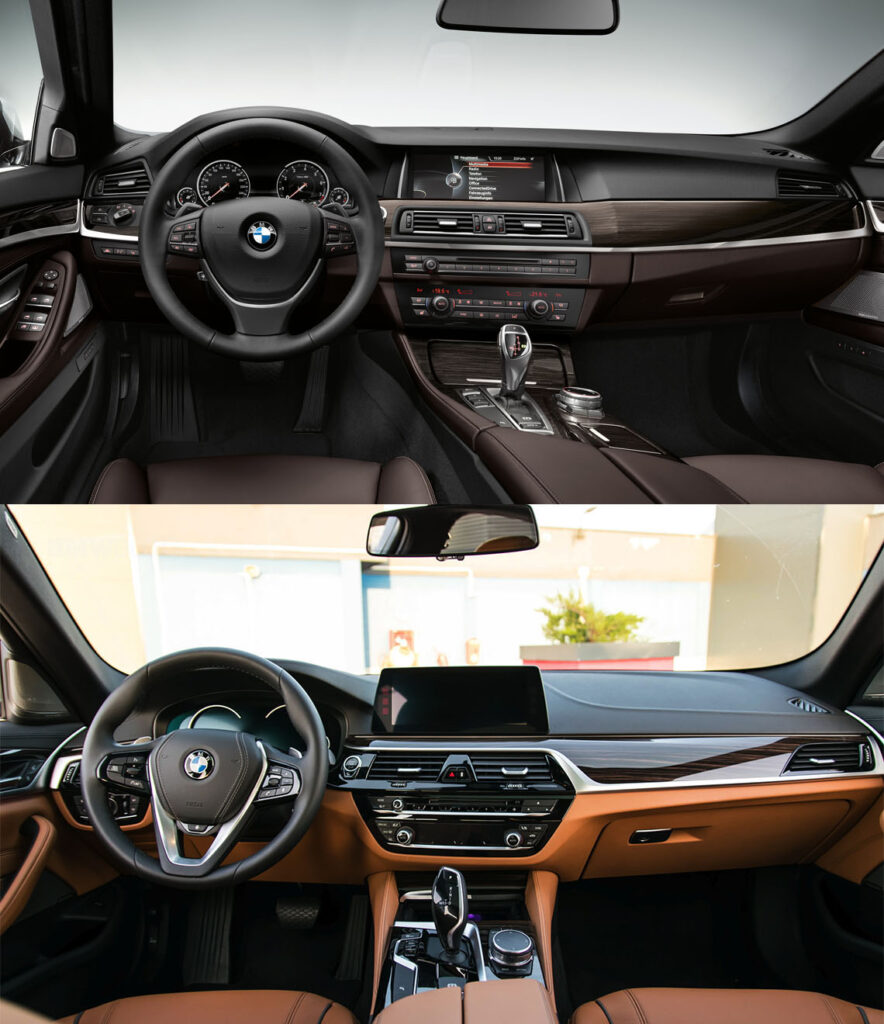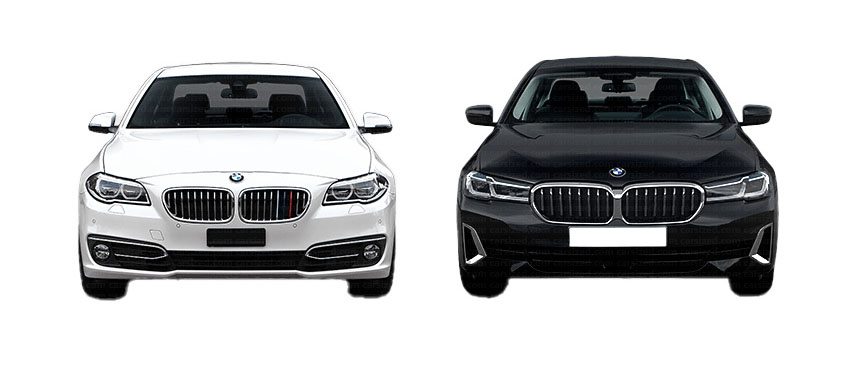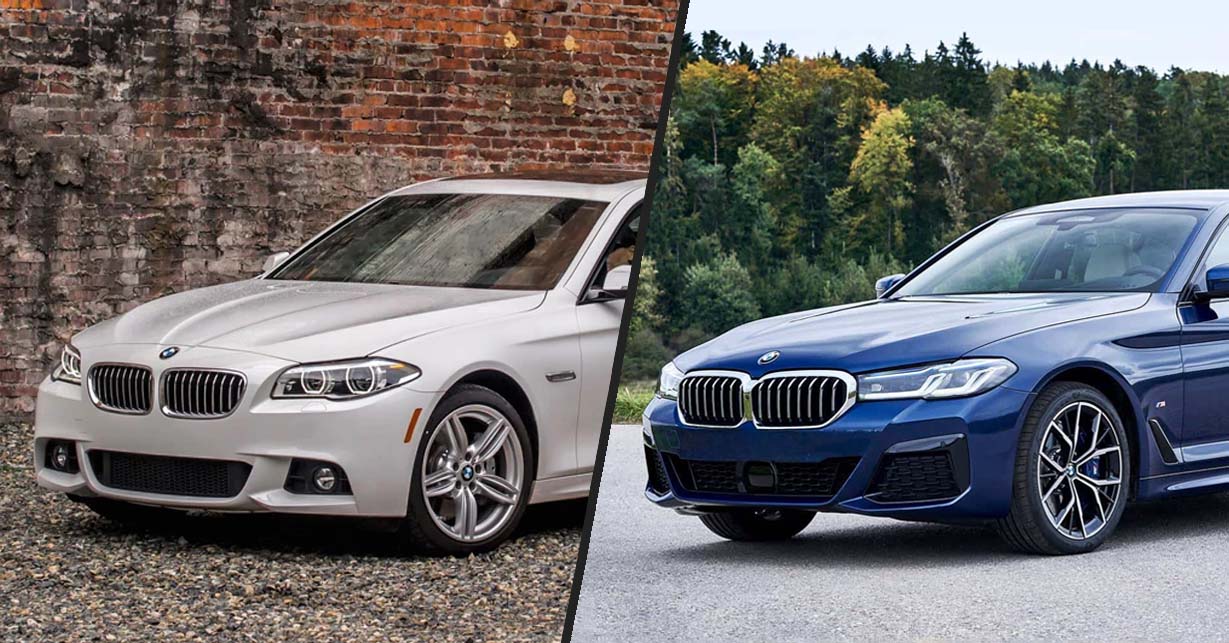For decades, BMW has set the benchmark for the sports full-size luxury sedan with the 5 Series. The F10 and the G30 are the latest iterations of the 5 Series, offering an excellent blend of luxury, comfort, and performance.
The G30 is a clear step forward for the 5 Series and is generally the better car, but the F10 still is one of the best luxury sedans on the market even a decade after its introduction.
How do these two models compare? Let’s compare the BMW F10 vs. G30 5 Series in terms of specifications, engines, chassis and driving feel, exterior design, interior, and more. Whether you are considering an upgrade or simply curious about how these models compare, we hope you find this article helpful.
BMW F10 vs. BMW G30 Specifications

| BMW F10 | BMW G30 | |
|---|---|---|
| Model Years | 2010 – 2016 | 2017-2023 |
| Engines (Gasoline) | N20, N52, N55, N63, N63TU | B48, B58, N63TU2, N63TU3 |
| Horsepower | 181 – 444 hp | 181 – 523 hp |
| Torque | 199 – 443 lb-ft | 214 – 553 lb-ft |
| Transmission Options | 8-speed ZF 8HP automatic, 6-speed manual | 8-speed ZF 8HP automatic, 6-speed manual (520d only) |
| Length | 192.9″ (4,899 mm) | 195.4″ (4,963 mm) |
| Width | 73.2″ (1,859 mm) | 73.5″ (1,868 mm) |
| Wheelbase | 116.9″ (2,969 mm) | 117.1″ (2,975 mm) |
| Curb Weight | 3,747 – 4,265 lbs (1,699 – 1,934 kg) | 3,538 – 4,486 lbs (1,605 – 2,035 kg) |
Comparing the two generations, it’s clear that the 5 Series has seen an increase in size, with the G30 generally being slightly longer and wider than the F10.
Despite the larger dimensions, the G30 manages to maintain a lighter curb weight than its predecessor. This is primarily due to the advanced materials used in BMW’s CLAR platform, which the G30 is constructed upon. The only model that increased in weight is the V8 model, as the F10 550i is ~200 lbs lighter than the G30 M550i.
In terms of engine power, the G30 offers more horsepower and torque across the entire model range, with higher-performing models like the M550i delivering impressive performance figures almost rivaling the F10 M5.
BMW F10 vs. G30 Engine Options
The F10 and the G30 use completely different engine offerings, with no engine shared between these two different generations of 5 Series. We’ll discuss the gasoline engine options, specifically those sold in North America.
F10 5 Series Gasoline Engine Options:
- N20
- N52
- N55
- N63, N63TU
G30 5 Series Gasoline Engine Options
- B48
- B58
- N63TU2, N63TU3
F10 Engine Options: N20, N52, N55, and N63
The N20 engine, a 2.0-liter inline-4 turbocharged powerplant, can be found in the 528i model. With an output of 241 horsepower, the N20 delivers a decent level of reliability and improved efficiency compared to its predecessor, the N55 engine. On the other hand, the N55, a 3.0-liter inline-6 turbocharged engine, powers the 535i model and offers a notable performance boost with its 300 horsepower and 300 lb-ft of torque. The N55 engine is highly tunable and can be easily upgraded to achieve impressive power gains with simple bolt-on modifications and tuning.
Between the N20 and the N55, we usually recommend opting for the 535i equipped with the N55. Although it has a higher initial price, its power, smoothness, sound and reliability are better than in the N20.
The N52 was only offered in 2010-2011 528i’s. Although it doesn’t have the strong low-end torque of turbocharged engines, the N52 is considered a better engine than the N20.
Another engine option available in the F10 lineup is the N63, which underwent various iterations throughout its production. Early versions of the F10 550i were equipped with the N63, with 2014 and up models being powered by the revised N63TU.
G30 Engine Options: B48, B58, and N63TU
The G30 chassis takes a leap forward in engine options, introducing the B-series B48, B58 engines and updating the V8 offering, with the and N63TU2, and N63TU3 engines. All of these engine options are more powerful, efficient, and reliable compared to their F10 counterparts.
The B48 engine, a 2.0-liter inline-4 turbocharged powerplant, powers the G30 530i. It delivers exceptional performance for its relatively small size and it is also a more refined engine compared to the N20 engine found in the F10 528i.
Stepping up the performance ladder, the G30 540i is equipped with the B58 engine, a 3.0-liter inline-6 turbocharged powerhouse. The B58 engine represents a substantial improvement over the N55 engine found in the F10 535i, with not only performance and fuel efficiency improvements but also enhanced reliability.
As for the range-topping model, the G30 M550i is powered by the N63TU2 and N63TU3 engines, depending on the model year. While the transition from the F10 550i to the G30 M550i didn’t involve a completely new engine, the latest iteration of the N63, the N63TU3, is a massively improved engine over the original N63 of the early F10 550i.
The engine options available in the G30 chassis offer significant improvements over their F10 counterparts. The B48 and B58 engines outperform the N20 and N55 in terms of power, efficiency, reliability, and refinement.
Engine Options Winner: G30
BMW F10 vs. G30 Driving Dynamics & Chassis
In terms of driving dynamics, suspension, and chassis, both the F10 and G30 deliver a comfortable and refined driving experience without compromising agility. The suspension on both cars absorbs bumps and road imperfections remarkably well, especially when equipped with adaptive suspension. A notable exception is the G30 M550i, which has a pretty stiff suspension that the M-lite car deserves.
With advancements in chassis technology, the G30 has increased body rigidity compared to the F10. Additionally, the G30 weighs approximately 100-120 pounds less than the F10 in similar models and configurations. This increase in the rigidity of the chassis along with the reduction in weight contributes to enhanced agility, allowing for more precise maneuvering on twisty roads and spirited driving.
The F10 has a more communicative steering rack, but the G30 has a better chassis
Both the F10 and the G30 fall short of the more engaging and communicative steering feel found in older 5 Series models like the E60. The hydraulic steering racks of older BMWs offered a level of steering feedback that allowed drivers to feel precisely what the chassis was doing, gauging grip levels with confidence.
Also, these modern 5 Series have been criticized due to their floaty and vague on-road feeling, but it’s worth noting that both are subject to high expectations as they are compared often compared to the smaller 3 Series. At the end of the day, neither of these are nimble, tossable cars but they still handle extraordinarily well for their class and size.
Driving Dynamics & Chassis Winner: G30
BMW F10 vs. G30 Reliability & Maintenance
Generally, an F10 will require more maintenance than a G30, but maintenance on the G30 will be more labor-intensive than the equivalent on an F10.
The B48 engine in the G30 530i is more reliable than the N20 engine in the F10 528i. Similarly, the B58 engine in the G30 540i is a significant improvement in reliability over the N55 engine in the F10 535i. That said, the B family of engines will have costlier repairs if something goes wrong.
Read more: N55 vs. B58 Reliability
The transition from the F10 550i to the G30 M550i was also a step in the right direction in dependability, as the G30 M550i is equipped with the latest iteration of the N63 engine, the N63TU4. Early N63 engines had notorious extensive issues but BMW has revised the engine substantially to the point where we can say owning a G30 M550i isn’t a bad idea.
If reliability is a top priority for you, we recommend looking for a G30 with the B48 or B58 engine, or an F10 with the old but robust N52.
Reliability Winner: G30
BMW F10 vs. G30 Interior & Comfort

Moving to the interior, the G30 takes the lead in terms of modernity and driver-oriented design. While the F10 may offer a slightly better quality of materials, the G30 presents a more advanced cabin. The G30 features an all-digital cluster, offering a futuristic and customizable display. The iDrive system in the G30 is faster and includes a touchscreen, providing a more intuitive and interactive user experience. Moreover, the G30 offers adjustable ambient interior lighting, allowing drivers to create their desired ambiance.
The F10 presents other interior advantages such as nicer interior materials and better analog gauges. A great blend between old-school BMW and current BMW interior design.
Overall, both cars have an excellent interior fit and finish, with the only big differentiating factor being the extra technology of the newer G30.
Interior & Comfort Winner: Tie
BMW F10 vs. G30 Exterior Design
Aesthetics are highly subjective and vary from person to person. While it’s impossible to reach a definitive conclusion, let’s look at these two 5 Series as impartially as we possibly can.
When equipped with the M-Sport package, the F10 exudes a captivating and sporty appearance. The sleek lines and aggressive styling elements enhance its overall presence on the road without being overly flashy. The M-Sport package includes features such as front and rear bumpers, side skirts, and larger alloy wheels, which contribute to a more captivating exterior aesthetic. With this package, the F10 stands out and showcases its sporty pedigree.

An F10 M-Sport is stunning, but the LCI G30 is one of the best-looking BMW sedans
In our opinion, the LCI (Life Cycle Impulse) G30 is the epitome of modern BMW design. The updated styling elements of the LCI G30 give it a fresh and distinctive look, setting it apart from its predecessor. One of the standout features of the LCI G30 is its headlights and taillights, which lend it a unique character. These lighting elements feature contemporary designs that incorporate the latest LED technology, adding a touch of sophistication and modernity to the overall appearance.
Ultimately, both the F10 and the G30 are well-regarded for their sporty and luxurious exterior designs. Whether you gravitate towards the M-Sport package of the F10 or find allure in the LCI G30’s modern and distinctive aesthetics, the choice comes down to personal preference. The important aspect is to find a design that resonates with your own style and preferences.
In conclusion, when comparing the exterior designs of the BMW F10 and the BMW G30, it’s important to recognize that beauty is in the eye of the beholder. While an F10 with the M-Sport package offers a sporty and captivating appearance, the LCI G30 showcases the best BMW can offer in terms of modern sedan design.
Exterior Design Winner: G30
BMW F10 vs. G30 Price & Value
In terms of price and value, the F10 proves to be a better value proposition. A well-kept used F10 535i can be found for around $15,000, while a used G30 540i typically starts at a higher price point of at least $30,000.
While the upfront cost is higher on the G30, over 2-3 years you might start seeing a slight cost advantage if you opted for the G30. Maintenance on a G30 will generally be lower than on an equivalent trim of the F10. For example, on an early F10 528i, you might have to put $3-4K aside to eventually replace the timing chains. The G30 530i doesn’t have issues of such magnitude.
Another factor to consider is depreciation. Most F10s will already be at the end of the depreciation curve while most G30s are still depreciating fast.
Still, if you do your due diligence before buying a used F10 and do your own diligence of making sure major issues have been addressed, the F10 5 Series will by far be a better value than buying the new G30.
Price and Value Winner: F10
Conclusion: Is the G30 5 Series better?
After comparing the BMW F10 and the BMW G30 extensively, it is clear that the G30 is better than the F10.
The G30’s superior engine options, lighter weight, better chassis, improved reliability, and modern interior features contribute to an enhanced driving experience. While the F10 still offers a compelling package more than 10 years after its introduction, the advancements and improvements in the G30 make it a better choice for those seeking the best of what BMW can offer in a full-size sedan.
On the other hand, if you’re looking for a value buy, the F10 5-Series is a great buy, although you might want to stick with the more reliable engine options such as the N52 or the N55.

